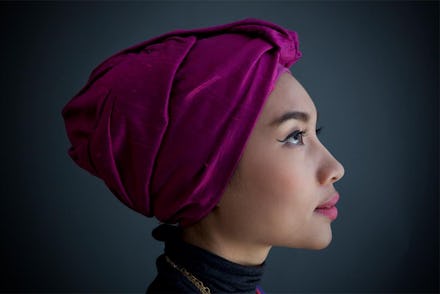Meet the Hijabi Pop Star Taking America By Storm

Yuna is a Malaysian pop star whose most recent LP, Nocturnal, has quickly become one of the most notable releases of the year. Nocturnal, put out by Verve Records, is a potpourri of danceable landscapes overlaid with buttery-smooth vocals, buoyant lyricism, and a tasty sprinkling of Eastern sensibility.
Yuna's not only unique for her music, though. She is also one of the few women in global pop to wear a hijab. She is fast becoming an icon for hijabi women because she maintains traditional dress while excelling in the super-fashionable pop world.
With a career path that seems to be on a non-stop skyward trajectory, including an award from the Prime Minister of Malaysia and a collaboration with Pharrell, Yuna is sure to be a name you'll be hearing more often. PolicyMic had a conversation with the songwriter about the Malaysian music scene, her transition from Malaysia to the U.S., and her latest record.
PolicyMic (PM): What are your first memories of music?
Yuna: "It Must Have Been Love." You know that song? (Laughs) Yeah, it's by Roxette. R-O-X-E-T-T-E. That was the first memory of music — just listening to songs in my dad's car.
PM: You started out writing and performing in Malaysia, but have now relocated to the U.S. How has the transition been?
Yuna: You know, I thought it would be difficult, but it was pretty easy and breezy for me, I guess, because there's not a lot of differences in Malaysia. People think that Malaysia is just a small country in South East Asia, and they have their own perceptions of how South East Asian countries are, but I grew up in Kuala Lumpur; Kuala Lumpur is a really modern, tech-y city. It's really modern, and there wasn't any culture shock coming out here. It was really cool to be able to come out here to work and be creative.
PM: What's the Malaysian music scene like?
Yuna: The music scene in Malaysia is, obviously, small. It's a small country, but its really growing — because of the internet, I think the world has become a smaller place and [Malaysia's] just connected to the new music that comes out from America and Europe. It's pretty amazing. A lot of the music kids are pretty much influenced by Western music, but at the same time there's also a lot of local musicians — like Malaysian kids who are in the independent scene, just trying to carry their Malaysian pride and stick to our own roots, and at the same time trying to make it pop, and trying to make it relevant and interesting and creative. I guess it's a small music scene, but it's growing and I'm excited to see how it will turn out.
I always, everywhere I go, introduce myself as Malaysian.
PM: Do you see yourself as an opportunity for Malaysian culture to influence Western music?
Yuna: I don't know, I guess, I am extremely proud of my roots. I always, everywhere I go, introduce myself as Malaysian, and I try as much as I can to bring some originality into my music and put Malaysian-sounding instruments, like those traditional instruments, into my music. I was able to do that on this album a little bit, but not too much because I mainly make pop music. I don't make 'world music,' for example. So I try to keep a little bit of something that is familiar to me and something that has to do with my roots in Malaysia, so maybe in the future if I could continue doing that, that would be amazing.
PM: What are the major musical influences behind Nocturnal?
Yuna: Nocturnal is a pop record, so I tried to mix a lot of R&B and electro music. That's why music is so interesting — and so cool — because you can add all sorts of other stuff. I could also add a little bit of Malaysian traditional-sounding instruments in there, and that was kind of what I had in mind for a very long time — what I wanted to do, and I never got the opportunity to do so.
For this album, I was always talking to my producers, so it's probably not in all of the songs, but some of the songs have a little bit of that [Malaysian influence] — so I was really happy to be able to do that.
PM: Have you noticed differences in the response to a female artist in Malaysia versus in the U.S.?
Yuna: You know what, not really. People would expect it to be different. You get into the entertainment industry and people are going to try and change you. I think that if you do [your career] the right way, it's also a way for you to find out who you really are, know your strengths, and know where you really grew up. I think I managed to do that for a very long time even before I came out here. Everyone has been really amazing and very supportive; I'm still the same girl I was, except I think I've learned so much throughout these years working out here. I would love to continue growing as an artist in the future.